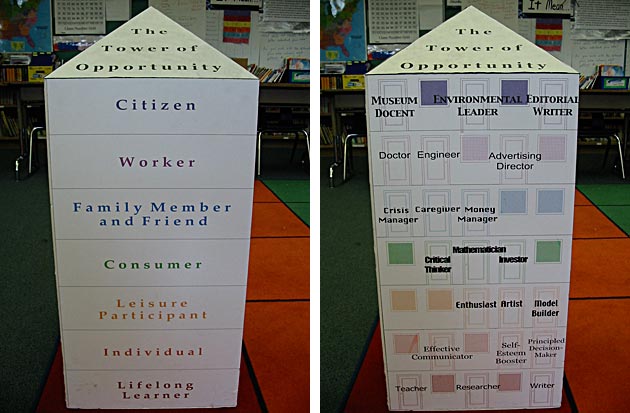Description
The Tower of Opportunity is a four-sided structure that helps students find greater meaning in their schoolwork and better understand how daily learning activities connect to the higher purposes we teachers try to promote in our classrooms. Each of the Tower's seven floors features one of the life roles Dale Parnell defines in his marvelous book Why Do I Have to Learn This?
The 7 Life Roles are:
- Citizen
- Consumer
- Family Member & Friend
- Individual
- Leisure Participant
- Lifelong Learner
- and Producer (Worker)
The role names occupy one side of the tower while specific examples of each role occupy the other three. Examples of each role are printed on doors that include tiny doorknobs.
The design of the tower empowers teachers to convey the message that life is rich with opportunities, choices, and options, but that in order to take advantage of these opportunities, maximize our choices, and give ourselves the greatest number of options, we need an education. Put simply, education is the key that opens doors. The harder we work in school and the more we learn, the more doors we can open for ourselves. Thus, the Tower provides a powerful visual metaphor that enables teachers to take normally abstract notions about the future and make them concrete.
An important aspect of the tower's design relates to the sequence of roles from bottom to top. The arrangement isn't random. Rather, it is an attempt to illustrate each role’s potential for contributing to and impacting the larger society. While the potential certainly exists for people assuming any role to make a difference in the lives of others, the roles located on the bottom tend to focus primarily on individual needs, goals, and priorities while those higher on the tower tend to involve progressively larger numbers of people.
The Tower is a significant reference point that students should revisit frequently. Whenever you begin a new unit or project, choose to discuss an item you heard on the news, want to capitalize on a teachable moment, or even decide to share a personal story, try connecting it to something on the tower. Every time you do, you remind your students of the numerous ways in which their learning can be put to use and the numerous reasons why learning matters. You expand their perspective and encourage them to think beyond their present reality. Furthermore, you provide them with a glimpse of what a productive, well-rounded life can look like. A Discussion Guide will be included with the purchase of each Tower of Opportunity.

Quote from Dale Parnell
"I certainly endorse your Tower of Opportunity...I would love to see it in every classroom."Quote from Steve
"As we discuss the tower every Wednesday as part of our morning routine, students talk about such things as the types of jobs they want, colleges they hope to attend, and contributions they want to make to their families and communities. When the kids talk about their plans for the future, they often connect something specific they are learning in the classroom to their larger goals. I have always believed that the most important decision young people can make is the one to commit themselves to education and make becoming a successful student their highest priority. Listening to students who have already made this commitment speak intelligently, thoughtfully, and sincerely about what they hope to accomplish as they get older is one of the greatest joys I experience in my job."Parnell Article Excerpt:
Dale Parnell, the author who defines the seven life roles in Why Do I Have To Learn This?, supports and endorses this project, and he has even referred to my work in a recent article he has written. An excerpt is shown below."Steve Reifman, a veteran 3rd grade teacher at Roosevelt Elementary School in Santa Monica, California, has developed a unique way to incorporate the life role career curriculum into his every day teaching. He has developed a visual symbol called 'The Tower of Opportunity' for his classroom.
This stand alone four sided tower is designed with seven levels, one for each Life Role Career. The other three sides of the Tower indicate specific examples of the various careers or situations involved in a Life Role Career. He observes that this visual metaphor helps his students connect daily learning activities to the higher purposes of elementary education. He is passionate about helping students connect something specific in real life to their educational experience.
The educational establishment can concentrate on hot topics such as high stakes testing, or longer school days or school years, etc., but they are not likely to be the crucial keys to improving student achievement. The difference will be made, as Steve Reifman has observed in his teaching experience, when students are helped to make connections with real life issues and see purpose in their daily learning."






